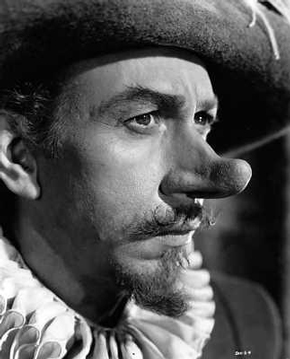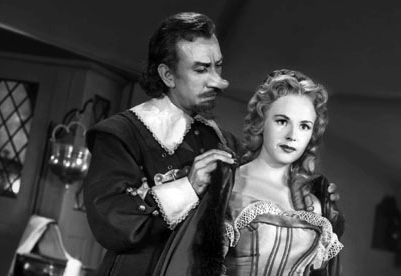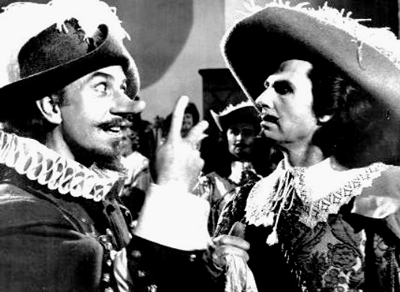
 |
|
|
|
Mention Cyrano de Bergerac these days and a film fan might remember the French Gerard Depardieu version from 1990. Until it more or less stopped being shown in the late 1970s, most American TV watchers were familiar with this 1950 Stanley Kramer/Carl Foreman stab at the classic story, an ambitious production made on a moderate budget. José Ferrer won the Oscar for his impressive performance as the hammy long-nosed Frenchman who wouldn't shut up. Helped by clever art direction and an excellent score, Cyrano de Bergerac was a big early success for the 'wildcat' independent producer Kramer, whose reward was a multi-picture deal with Harry Cohn at Columbia. 
Working from the play by Edmond Rostand, screenwriter Carl Foreman's standard telling even more closely favors the character of the swordsman and poet with the long nose. Cyrano de Bergerac (José Ferrer) loves the beautiful Roxanne (Mala Powers) but discovers that she favors the handsome Christian de Neuvillette (William Prince). He woos her for the younger man, substituting his poetry for Christian's tongue-tied lack of imagination. But war with Spain intervenes to change all of their fates. Rostand's Cyrano is a fountain of romance and sentimental poetry presented with good will and substantial wit. Foreman retains the stage talk but manages to open the film up just enough to avoid stuffiness. Ferrer's Cyrano fights two major duels in the first reel before the plot settles down to the time honored substitute-lover gambit, the one imitated ad infinitum in other plots and situation comedies. Christian is handsome but an inarticulate oaf when it comes to words. Cyrano's nose scares women and starts swordfights but his poet's tongue could woo a stone statue. A fine director of actors, Michael Gordon later helmed Pillow Talk, helping to forge a style of romantic comedy that would stay in vogue for twenty years. Considering the limited resources his accomplishment on Cyrano de Bergerac is impressive. The costumes never look shabby and even the battle scenes filmed on an interior sound stage don't look cramped. Gordon keeps us focused on the emotions and the actors, and everything else takes a subordinate position. 
Cyrano fights like a hero but suffers like a fool in love, and it's impossible not to empathize with him. We just plain like the guy. The makeup used to create his impossibly long nose is unapologetically theatrical, but certainly effective. The only time it (ahem) sticks out is when Ferrer throws his head back to show those two long nostrils. Seen from below the nose looks like an alien vegetable, growing on the actor's face. It's José Ferrer's show of course. He holds the screen with the best of them, just as he'd later run away with any movie even when cast in a small part (The Caine Mutiny, for one). At this time Ferrer was something of a wonder on the New York stage, reportedly appearing in two plays at one time. His polished voice and mannerisms refresh the art of stage posing. Even when standing still making flowery talk about sunsets and broken hearts, we buy it. The abundance of comedy in the script is a big help. Cyrano's disgusted reaction after Christian (an okay William Prince) flops with Roxanne is really funny. Carl Foreman's script dovetails into a coda fifteen years down the road, in which Cyrano makes a poignant death-speech to Roxanne, revealing that it was he who loved her all the time. It's calculated, obvious and yet works extremely well. Audiences loved Cyrano, José was inaugurated as a film star and Stanley Kramer had the hit that helped him weather several flopperoos until his triumph with High Noon and his fight with Carl Foreman. 
The supporting cast is adequate but not much more, although the film focuses so closely on Cyrano it would hardly make a difference. Familiar faces like Don Beddoe and Percy Helton add appropriate color. The nun in the final scene is Virginia Christine, later memorable in Invasion of the Body Snatchers and as Mrs. Olsen on the long-running Folger's coffee commercials. One of the prettiest discoveries of the '50s, Mala Powers (The City that Never Sleeps, The Unknown Terror, The Colossus of New York) handles the lines well enough, but doesn't really shine. This is too bad, as Ms. Powers certainly had talent when well directed. She had just done the groundbreaking Outrage for director Ida Lupino, possibly the first American sound feature to focus on the experience of rape from the victim's point of view. Olive Films' Blu-ray of Cyrano de Bergerac is a major revelation. Like many older United Artists releases, inadequate printing elements for TV versions were all that most of us ever saw on this title. A 2004 Image disc was soft and light, with a low soundtrack. This new HD transfer has a few blemishes but looks fantastic overall. Franz Planer's sharp BW images are rich in contrast and the audio is equally sharp. It looks like a "Museum Screening We Never Saw." Cyrano de Bergerac can also boast a lively music score by Dimitri Tiomkin, who composed most of Stanley Kramer's early productions, right up to his most acclaimed hit High Noon.
On a scale of Excellent, Good, Fair, and Poor,
Cyrano de Bergerac Blu-ray rates:
Reviews on the Savant main site have additional credits information and are often updated and annotated with reader input and graphics. Also, don't forget the 2011 Savant Wish List. T'was Ever Thus.
Review Staff | About DVD Talk | Newsletter Subscribe | Join DVD Talk Forum |
| ||||||||||||||||||